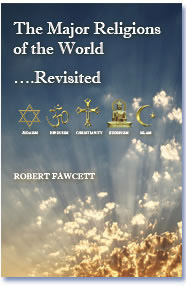| < Previous | Next > |
 Islamic Denominations
Islamic Denominations
Islam consists of a number of religious denominations that are essentially similar in belief, but which have significant theological and legal differences.
According to most sources, approximately 85% of the world's Muslims are Sunni, and approximately 15% are Shi'a; however, there is a small minority who are members of other Islamic sects. So, the primary division is between the Sunni and the Shi'a (or, Shii) as to who should lead the community, with
Sufism (a sect that garners a lot of press) generally considered to be a mystical inflection of Islam rather than a distinct school.
Wahabbism is one of these smaller Islamic sects that that is being exported by Saudi Arabia.
Leadership within the Islam religion changed with the death of Muhammad. The resulting evolution of the leadership for the basis for the various Islamic denominations.
With the traumatic event of Muhammad's death in 632, which marked the end of direct guidance from the Prophet, the development of the Caliphate began. When the Ottoman Empire ceased to exist, Mustafa Kemal Ataturk officially abolished the last Caliphate, and founded the Republic of Turkey in 1924.
History Channel Video 1 On Islamic Denominations
Video Is Continued At Bottom of Page
Top ^
Sunni Islamic Denomination
Sunni is the major Islamic Denomination. The majority of Muslims came to be called Sunni (or, Sunnis), because they are followers of the Sunnah example of the Prophet. (See section on Islam culture) They adopted the belief that leadership should pass to the most qualified person, not through hereditary succession.
The Sunni selected Abu Bakr, Muhammad's close companion and trusted advisor, to be Caliph. While the Caliph Abu Bakr was not a Prophet, as the Qur'an had declared Muhammad to be the last of the Prophets, the Caliph had religious prestige as head of the community of believers, the Ummah.
This marked the beginning of the leadership period known as the Rightly-Guided Caliphs. The Rightly-Guided Caliphs, the first four, ruled from 632 to 661. This period is regarded as the normative period of Sunni Islam, and provides the ideal past to which Muslims look for inspiration and guidance today. All of them were Muhammad's companions, and were chosen by a process of consultation.
The Sunni majority remembers a golden age of faith in empire, marked by Islam's spread and expansion globally as a faith world power in civilization. Within a century of Muhammad's death, Islam, as a faith and as an Islamic empire, stretched from North Africa to South Asia. Thus, success, power, and wealth are seen as evidence of ALLAH's favor, and historic validation of Islam.
Top ^
Shi'a Islamic Denomination
The Shi'a (or, Shii, Shiis), meaning "the party of Ali," who constitute the second-largest branch of Islam, believe that succession should be hereditary, staying within the Prophet's family. They believe that Ali ibn Abi Talib, as the closest living male relative of Muhammad (cousin, and son-in-law - married to his daughter, Fatima), was his rightful successor, and they called him the first Imam (leader), rejecting the legitimacy of the previous Muslim caliphs.
To most Shi'a, an Imam rules by right of divine appointment, and holds "absolute spiritual authority" among Muslims, having final say in matters of doctrine and revelation. So, they believe that the political and religious leadership of Imams, from the hereditary succession of Ali, are in a state of ismah, meaning infallibility - the final authoritative interpreter of ALLAH's will as formulated in Islamic law.
What created the real schism, the real rupture between Sunni and Shi'a, was when Ali's son and Muhammad's grandson, Hussein, was killed in a rebellion to recover leadership.
Ali was passed over for the position of Caliph three times. Finally, gaining this position after 35 years, he was assassinated only a few years later. Ali's followers remained disaffected. Their opposition to the established rule, the Umayyad Dynasty, came to a head in 680 when Ali's son and Muhammad's grandson, Hussein, led this rebellion in an attempt to recover the leadership of the Muslim community.
Hussein, and his small band of followers, about 100 strong, were slaughtered by overwhelming forces of the Umayyad army, perhaps as many as 100,000, at Karbala, a city about 60 miles southwest of modern day Baghdad, Iraq. This is referred to as the Battle of Karbala.
The memory of this tragedy, called the "martyrdom of Hussein," created a paradigm, a model, of suffering and protest that has guided, and inspired, Shiis ever since.
Shi'a Muslims consider Karbala to be one of their holiest cities after Mecca, Medina, Jerusalem, and Najaf (a city in the same area, the burial site of Ali). The city is now a great center of pilgrimage from throughout the Shi'a Islamic world. Amazingly, it is estimated that only Mecca and Medina receive more Muslim pilgrims.
The Day of Ashura (the word means "tenth") is on the 10th day of Muharram, the first month in the Islamic calendar. It is commemorated by Shi'a Muslims as a day of mourning for the martyrdom of Ali at the Battle of Karbala on that day. Further, Shi'a Muslims believe that Moses fasted on that day to express gratitude to God for liberation of Israelites from Egypt, and Muhammad fasted on this day and asked other people to fast. In some countries and regions, such as Iran, Commemoration of Ali has become a national holiday, and all Shi'a ethnic and religious communities participate in some manner.
Shi'a Islam has several branches, but three major divisions. While these divisions have other differences, such as acceptance of parts of the Hadith (see section Islamic traditions) attributed to rejected either leaders or transmitters, the principle disagreement came into play over succession as to how many imams, or leaders, each community recognized: Fivers (also known as Zaydis), Seveners, and the Twelvers (also known as Ithna Asharis) is the largest of these major divisions. The numbers five, seven, and twelve refer to the number of authorized interpreters of the law, or Imam, that each group accepts.
The Twelvers are the most popular of the Shi'a. (By way of example, they are the overwhelming majority in the country of Iran, where is it is the official religion.) These followers put forward the belief that the last imam went into hiding, or occultation, creating the doctrine of the Hidden Imam. The Hidden Imam is expected to return as a Mahdi, a messianic figure, who will come at the end of time to restore the community to its rightful place, and usher in a perfect Islamic society in which truth, and justice, will prevail.
In any event, the overall Shi'a minority, who had failed in their opposition to Sunni, saw themselves as victims of the illegitimate usurpation of power by Sunni rulers at the expense of a just society.
For Shi'a Muslims, history serves as the theater for the struggle of an oppressed and disinherited minority community to restore ALLAH's rule on Earth over the entire Muslim community, under the leadership of the imam. This has remained a frustrated hope, and expectation, for all Shi'a Muslims across the centuries.
Top ^
Sufism
Although not technically an Islamic Denomination, Islamic mystics are called Sufis, and their way of life is Sufism (also spelled Sufiism). Sufism is less an Islamic denomination than a mystical way of approaching the Islamic faith, and is a spiritual practice followed by both Sunni and Shi'a. Both men and women participate in Sufism. It has been a prominent movement within Islam throughout most of its history.
It has been defined as "mystical Islamic belief, and practice, in which Muslims seek to find the truth of divine love, and knowledge, through direct personal experience of God." Mysticism is the doctrine that it is possible to achieve communion with God through contemplation and love, without the medium of human reason.
It grew out of an early ascetic (meaning, one who lives a life of rigorous self-denial for religious purposes) movement within Islam, which sought to counteract the worldliness that came with the rapid expansion of the Muslim community. Sufis found that emphasis on this life (in contrast to the next), on power and wealth, and on Islam as a system of laws and rules, to be spiritually lacking. So, like Islamic law, Sufism (or, Islamic mysticism) began as a reform movement in the Umayyad Empire (the period after the Rightly-Guided Caliphs).
In contrast to the exterior path of law and rules, they emphasize the more interior path of piety and devotional love. The early Sufis, or mystics, pursued an ascetic lifestyle that emphasize detachment from the material world, repentance for sins, and focus on the Last Judgment. "Little sleep, little talk, little food" are fundamental, and fasting is considered one of the most important preparations for the spiritual life. They dedicated themselves to a life of prayer, fasting, meditation on the Qur'an -- an imitation of Muhammad.
Sufis came to be often in conflict with the more orthodox, and legal-oriented/legalistic, ulama (meaning, religious scholars). The conflicts revolved around issues of authority and power. The ulama sought typically to apply "the letter of the law," while Sufis were more concerned with "the spirit of the law."
A prominent theologian, Abu Hamid al-Ghazali (who passed away in 1111), synthesized and reconciled the diverse religious and philosophical currents of that day, tempering reason and law with Sufism's emphasis on religious experience, and love of God, ALLAH. His greatest work was the book, The Revivification of the Religious Sciences, which led to his recognition as one of Islam's greatest scholars. He was awarded the title "Renewer of Islam", a title which is reserved for one individual in each century.
Sufism continues to be a positive, guiding light within the Islam religion.
Top ^
Wahhabis (also known as Salafis)
Wahabi Islam arose in the 18th century in Saudi Arabia. Wahabbism is recognized as the official religion of Saudi Arabia. They classify themselves as Sunni, and claim to follow the Hanbali legal tradition (Hanbali is one of the Sunni religious schools).
It was founded by Muhammad ibn Abd al-Wahhab (1703 - 1793). It became known as Wahabbism, and its founder was an Islamic scholar born in Najd, in present-day Saudi Arabia. Despite never specifically calling for a separate school of Islamic thought, it is from ibn Abd-al Wahhab that the world derived the term Wahhabism.
Ibn Abd al-Wahhab spent time studying with Muslim scholars in Basra (in southern Iraq). Continuing his studies, he traveled to the Muslim holy cities of Mecca and Medina to perform Hajj, and studied with the scholars there before returning to his home town of Uyayna in 1740.
After his return to Uyayna, Ibn Abd al-Wahhab began to attract followers there, including the ruler of the town. With his support, Ibn Abd al-Wahhab began to implement some of his ideas for the purpose of reform. Some examples:
- First, he persuaded the leader to level the grave of Zayd ibn al-Khattab, a companion of the Muslim prophet Muhammad whose grave was revered by locals, citing Islamic teachings that forbid grave worship;
- Second, he ordered that an adulteress be stoned to death, a practice that had become uncommon in the area despite having Islamic textual basis.
He was gaining a large following, as it was perceived that the people were drifting away from the true teachings of Islam, the teachings of Muhammad.
However as time moved on, these types of actions were unpopular with the local leader, and he was forced to leave Uyayna. Upon his expulsion from Uyayna, he was invited to settle in neighboring Dir'iyya by its ruler Muhammad ibn Saud in that same year of 1740. Two of Ibn Saud's brothers had been students of his in Uyayna, and are said to have played a role in convincing Ibn Saud to take him in. Ibn Saud's wife is also reported to have been a convert to his cause.
Because of his charisma and potential popularity with the people, a pact was made between these two men that if he would aid his efforts, Ibn Saud pledged to implement his teachings, and enforce them on neighboring towns.
Beginning in the last years of the 18th century, Ibn Saud and his heirs would spend the next 140 years mounting various military campaigns to seize control of Arabia, and its outlying regions. They finally took control of the whole of modern day Kingdom of Saudi Arabia in 1922, and this included control of the holy cities of Mecca and Medina.
Wahabbism would have probably remained insignificant, and considered heretical by the mainstream, but for twentieth-century oil wealth. It adopts a much more hard-line interpretation of the Qur'an and Hadith. The below excerpts are from an article posted on the independent student newspaper website (TheTriangle.org) at Drexel University, 7/03/2009, and best highlights this hard-line approach:
Sheikh Usama ibn Akhmed is a professor of Wahabbism at Drexel University, and the president of Wahabbism Now for America. This article was issued 4/02/2004.
"America is corrupt! America is immoral! America is ruled by Satan, who employs the Jews to carry out his bidding! If you are still reading this that means that there is still some hope for your soul. I, Sheikh Usama ibn Akhmed, am the president of Wahabbism Now for America. Our organization recognizes the massive moral shortcomings of this immoral culture and attempts to fix it by enforcing the purest form of Islam; this form of Islam, Wahabbism, is the law of the Holy Kingdom of Saudi Arabia and we will impose it on America and all its inhabitants.
We are trying to educate the population of our aims so that they can submit themselves on their own accord without forcing us to resort to violence.
First and foremost, all shall be required to accept that our path is the one and only true path to salvation. So long as all of you follow this, then God may have some mercy on your souls and forget your decades of sinful living.
Part of America's sin-filled society is due to the excessive freedoms that are available to women. These freedoms promote immorality and promiscuity and must be restricted immediately so that a return to purity can be achieved. When we come to power, we will decree that no women shall be allowed to go to school or work. Education is useless to women, because it is God's will that their duty in life is to stay at home and raise children.
We will also make polygamy legal. Polygamy is required in many cases so as to protect that chastity of women. As women stay unmarried longer, the chance of them being overcome by lust and sin increases. There is no doubt that a woman having one-half of a husband, or one-third or one-fourth of one is better off than the woman having no husband at all.
Of course it goes without saying that soon all shall be forced to convert to our religion and follow our beliefs."
The terms "Wahabi", "Salafi" (and also sometimes Ahle Hadith) are often used interchangeably, but Wahabi has also been called "a particular orientation within Salafism", an orientation considered to be ultra-conservative.
Salafism: "predecessors" or "early generations;" an ascription of the term Salaf was used by Muhammad who noted, "I am the best Salaf for you." Salafis view the first three generations of Muslims, who are Muhammad's companions, and the two succeeding generations after them, as examples of how Islam should be practiced.
Many explain their beginnings "as two distinct movements." However, the migration of Muslim Brotherhood members from Egypt to Saudi Arabia, and Saudi King Faisal's embrace of Salafi pan-Islamism, resulted in cross-pollination between ibn Abd al-Wahhab's teachings (Wahabbism) on the Oneness of God, the sin of idolatry, and so forth, and Salafi interpretations of the Hadith (Salafism).
Salafism appeals to younger Muslims as a way to differentiate themselves from their wrong beliefs of parents and grandparents, because it is seen as pure, stripped of the local, superstitious, and customary Muslim practices of their families' countries of origin. It confers a sense of moral superiority. Salafism has a potent appeal because it underscores Islam's universality.
Salafism reject not only Western ideologies such as Socialism and Capitalism, but also common Western concepts like:
- economics
- constitutions
- political partie,
- and revolution
Muslims should not engage in Western activities like politics, "even by giving them an Islamic slant." Instead, Muslims should stick to traditional activities, particularly Dawah (meaning "to summon, to invite", referring to God's invitation to live according to his will). Salafis promote Islamic law (Shari'a), rather than an Islamic political program.
Because of this partnership between Muhammad Abn al-Wahhab (which became Wahabbism) and Muhammad ibn Saud (which became the Kingdom Of Saudi Arabia), Saudi Arabia's impact on Islam has been, and continues to be, considerable and significant. This is due to Saudi control of Mecca and Medina, the Islamic holy places, and because of the Saudi vast oil wealth, Saudi Wahabiism is exported around the Islamic world by the sponsorship of schools, colleges, universities, and mosques in which their doctrines are advanced.
The excesses of the Taliban in Afghanistan originated in Wahhabism, as does the al Qaeda terror campaign against the western world.
Continuation of the Above History Channel Video About Islam (Videos 2 and 3)
www.woodstock-memories.com
Top ^
| < Previous | Next > |




